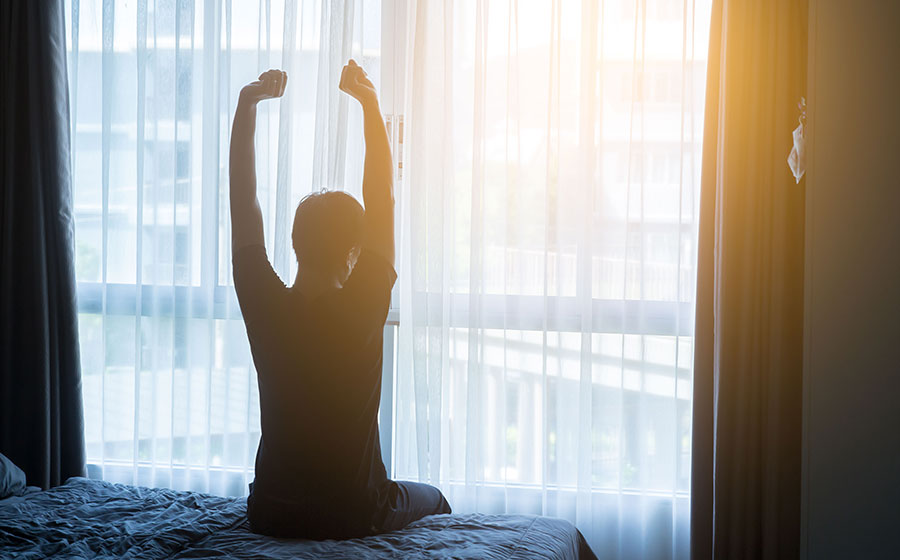Sleep Hygiene – How To Combat Problems Sleeping
‘Sleep hygiene’ refers to the habits and routines you practice around sleep. Poor sleep hygiene leads to problems sleeping such as difficulty falling asleep, frequent waking, and, in some cases, persistent insomnia.
Improving sleep hygiene means making behavioural and lifestyle changes. Good sleep hygiene will vastly increase your chances of getting a more restful, better sleep.
Tips for improving sleep hygiene
1. Have a consistent bed time and wake up time
Regularity is one of the most important aspects of sleep hygiene. Try to get to bed at the same time each night and set your alarm for the same time each morning, even on weekends. Varying your sleeping schedule, even by just 1 hour, can result in greater levels of daytime fatigue.
2. Avoid naps late in the day – or don’t nap at all
In adults, naps are best kept short (under 30 minutes). Do not nap after 5 p.m. Long naps and late -day naps can disrupt your sleep cycle, making it difficult to fall asleep at night.
3. Create a sleep-friendly environment
The environment in which you sleep effects your sleep quality. There are four key ingredients to a perfect sleeping environment.
- Comfort: a comfortable mattress and pillows will make it easier to relax and achieve a more restful sleep.
- Darkness: limiting light will trigger your brain to prepare for sleep and produce more melatonin (the sleep hormone). Try using heavy curtains and removing artificial light sources from your bedroom.
- Temperature: our body temperature needs to drop before we fall asleep. Keep your room cool and well ventilated to help you settle and stay asleep.
- Quiet: outside noise can disrupt sleep. Sleeping with ear plugs, a fan, or white noise can help mask external noise.
Your bed should only be used for the two S’s: sleeping and sex. Other activities like working or watching a movie in bed are not recommended. Your brain needs to associate getting into bed with going to sleep.
4. Stay away from screens 1 hour before bed
The blue light from phones, tablets, and laptop screens suppresses melatonin, tricking your brain into staying awake. Using your phone or computer also keeps your mind engaged. Turn off your devices at least 1 hour before bed.
5. Establish a calming bedtime routine
Instead of watching Netflix or browsing the internet, opt for more soothing activities in the lead-up to sleep. Try reading, meditating, or taking a bath. Avoid stressful or stimulating activities such as work or study.
6. Exercise during the day – but not before bed!
Regular physical activity can improve sleep quality and promote more restful sleep. Exercising close to bedtime, however, can have the opposite effect. Exercise raises your body temperature, and your body needs to cool before you sleep. No strenuous exercise should be done within 3 hours of bedtime.
7. Lose weight
Being overweight is a common cause of many sleep issues. Excess fat cells can make the airway narrower and floppier, causing sleep disorders such as sleep apnoea (link to sleep apnoea page) or snoring. These conditions can severely decrease the quality of your sleep, causing you to wake frequently during the night.
8. Avoid eating too much late at night
When you have a late-night snack, the muscles that digest your food must keep working when they should be resting. This delays sleep and prevents you from achieving deep, restful sleep. This also allows less time for the stomach to empty itself and may aggravate reflux, which in turn affects the upper airway while you sleep. Try to leave at least 2 hours between your last snack and bedtime.
9. Don’t stay in bed if you can’t fall asleep
If you are struggling to fall asleep for longer than 10 to 15 minutes, get up and leave your bedroom. Lying in bed worrying that you are not sleeping is counterproductive. We recommend you get up and do something “mildly entertaining, but sedate”. This could include reading, listening to music, or meditating. Once you start getting sleepy, return to bed.
10. Limit caffeine and alcohol
Caffeine is a stimulant that can make it difficult to fall asleep. If you are having problems sleeping, limit your caffeine intake, and try to consume it only before noon. Also limit alcohol consumption, as alcohol reduces sleep quality and time spent in REM sleep.
11. Don’t be a clock watcher
Watching time pass can greatly increase stress and prevent you from falling asleep. Make sure any clocks in your bedroom are not visible to you. If you awaken during the night, don’t check the time. Being aware of when you need to wake up can prevent you from falling back to sleep.
When to get help for problems sleeping
If you continue to experience sleep problems after applying best-practice sleep hygiene, you may have an underlying sleep disorder. These disorders can be physical, such as sleep apnoea or restless legs syndrome, or psychological, such as stress or anxiety.
A sleep physician can help you diagnose the root of your troubled sleep and offer some treatment options. Many people find relief from poor sleep through simple lifestyle and habit adjustments. However, medical treatments such as CPAP or surgery may be required. Either way, you will have a greater chance of sleep success when approaching troubled sleep holistically.


